THREE CONFESSIONS OF THE COMMANDER
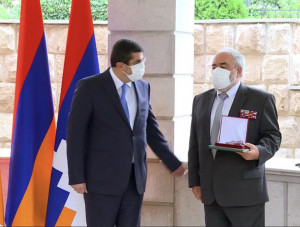 On the occasion of the 29th anniversary of the Artsakh Republic, Diaspora Armenian Commander Hovsep Hovsepyan was awarded the Combat Cross of the 1st degree by the decree of the Artsakh Republic President Arayik Harutyunyan.
On the occasion of the 29th anniversary of the Artsakh Republic, Diaspora Armenian Commander Hovsep Hovsepyan was awarded the Combat Cross of the 1st degree by the decree of the Artsakh Republic President Arayik Harutyunyan.
Confession One
Before Artsakh
I will try, once again I will try to tell about myself…
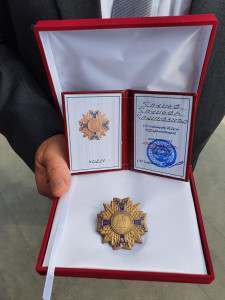 At this age, my cherished, perhaps most sincere, wish came true. Hovsep Hovsepyan, born in a family of Cilicia deportees, raised and educated in France, got married in Dadivank. Do not pay attention to the fact that I speak with a special accent in my mother tongue, in fact I have always been Armenian. With my grandparents, with whom I grew up, I attended the Armenian Church every Sunday, participated in national mourning and festivals, field parades. Perhaps that is why, when I graduated from the University of Aix-en-Provence and received the qualification of a sociologist, I chose the Armenian community of Marseilles and the preservation of national customs as the topic of my scientific thesis. There are more than a hundred thousand Armenians in my birthplace, which has a population of about one million, that is, every tenth passer-by on any street is definitely Armenian. Unfortunately, before the creation of the secret armies, many had forgotten their origins or talked about their Armenian roots as if they were remembering a detail that had nothing to do with them. I must say without exaggeration, awakening the Armenian youth from its slumber was one of the priority tasks of our armed activity. When I was first arrested by the French police in 1985, I was the Deputy Editor-in-Chief of a newly established radio station in Marseille. I was formally charged with allegedly participating in the hijacking of an armored vehicle transporting large sums of money from the airport to the central bank. Only after many interrogations did it become clear that I had incomparably serious doubts. Documents appeared which indirectly testified that I had led the assassinations of Turkish ambassadors in different European capitals and participated in various acts of violence. It is true that the investigation could not prove my guilt, but I remained under the control of the secret police forever. After each ASALA operation, I was called for questioning. Thus, three lawyers conducted my case, and when I felt that the facts were gradually becoming ruthless, I would not be able to justify myself during the trial, so I left the investigator’s room and ran away. Endless wanderings began. First I hid in France, then I went to Italy, Yugoslavia, Greece, Cyprus, in two years I changed about thirty countries. As soon as Monte Melkonyan was released from prison, we decided to come to Armenia together. Of course, in different ways. I will never forget how the train bringing me from Moscow stopped at the first Armenian station, and although I was secretly entering the homeland, I could not resist, jumped down and kissed the ground. Our sacred land, which we have believed in for a moment after being a symbol for me for so many years, has become a cult.
At this age, my cherished, perhaps most sincere, wish came true. Hovsep Hovsepyan, born in a family of Cilicia deportees, raised and educated in France, got married in Dadivank. Do not pay attention to the fact that I speak with a special accent in my mother tongue, in fact I have always been Armenian. With my grandparents, with whom I grew up, I attended the Armenian Church every Sunday, participated in national mourning and festivals, field parades. Perhaps that is why, when I graduated from the University of Aix-en-Provence and received the qualification of a sociologist, I chose the Armenian community of Marseilles and the preservation of national customs as the topic of my scientific thesis. There are more than a hundred thousand Armenians in my birthplace, which has a population of about one million, that is, every tenth passer-by on any street is definitely Armenian. Unfortunately, before the creation of the secret armies, many had forgotten their origins or talked about their Armenian roots as if they were remembering a detail that had nothing to do with them. I must say without exaggeration, awakening the Armenian youth from its slumber was one of the priority tasks of our armed activity. When I was first arrested by the French police in 1985, I was the Deputy Editor-in-Chief of a newly established radio station in Marseille. I was formally charged with allegedly participating in the hijacking of an armored vehicle transporting large sums of money from the airport to the central bank. Only after many interrogations did it become clear that I had incomparably serious doubts. Documents appeared which indirectly testified that I had led the assassinations of Turkish ambassadors in different European capitals and participated in various acts of violence. It is true that the investigation could not prove my guilt, but I remained under the control of the secret police forever. After each ASALA operation, I was called for questioning. Thus, three lawyers conducted my case, and when I felt that the facts were gradually becoming ruthless, I would not be able to justify myself during the trial, so I left the investigator’s room and ran away. Endless wanderings began. First I hid in France, then I went to Italy, Yugoslavia, Greece, Cyprus, in two years I changed about thirty countries. As soon as Monte Melkonyan was released from prison, we decided to come to Armenia together. Of course, in different ways. I will never forget how the train bringing me from Moscow stopped at the first Armenian station, and although I was secretly entering the homeland, I could not resist, jumped down and kissed the ground. Our sacred land, which we have believed in for a moment after being a symbol for me for so many years, has become a cult.
It gave me a purpose of life.
Clarified the meaning of my existence in this life.
Confession Two
In Artsakh
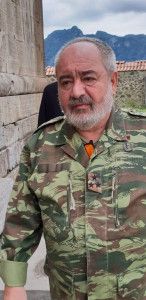 Many people were waiting for me in Armenia. Some could not wait, they came to Moscow to meet. It is true that I did not waste time, still abroad, through reliable representatives, I clarified what volunteer detachments are fighting in the border regions, in Artsakh, what goals they are pursuing, but, nevertheless, after arriving, I considered it necessary to meet with the commanders separately. During three weeks we only came to an agreement with Leonid Azgaldyan. In late December of 1990, we went to Artsakh together for the first time. Our goal was to create a national-liberation volunteer army, that visit was only of an organizational nature. We urged the local population to immediately arm themselves, form self-defense groups, in other words, prepare for the struggle. Of course, small military groups were formed, there were, but the faith in the regime, Gorbachev’s perestroika was still strong. Many listened to us with distrust, did not believe in their own strength and victory.
Many people were waiting for me in Armenia. Some could not wait, they came to Moscow to meet. It is true that I did not waste time, still abroad, through reliable representatives, I clarified what volunteer detachments are fighting in the border regions, in Artsakh, what goals they are pursuing, but, nevertheless, after arriving, I considered it necessary to meet with the commanders separately. During three weeks we only came to an agreement with Leonid Azgaldyan. In late December of 1990, we went to Artsakh together for the first time. Our goal was to create a national-liberation volunteer army, that visit was only of an organizational nature. We urged the local population to immediately arm themselves, form self-defense groups, in other words, prepare for the struggle. Of course, small military groups were formed, there were, but the faith in the regime, Gorbachev’s perestroika was still strong. Many listened to us with distrust, did not believe in their own strength and victory.
For the second time Leonid and I wnet to Shahumyan in January 1991 in the harsh winter conditions, we set up a military camp in the forest. First of all, it was exceptionally disciplined: smoking and alcohol were not allowed. Many volunteers could not stand the unusual conditions, they left. And they started telling incredible details about our military exercises, the peculiarities of training. Myths were circulating, in particular, about a commander from France, apparently because I could not communicate directly with anyone, could not explain. It is true that during the year I spent in prison in Marseilles, I tried to learn my mother tongue, but when I arrived in Armenia, especially in Artsakh, I came across a completely different, almost incomprehensible Armenian language. In any case, my example became contagious for many …
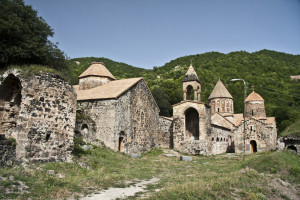 Gradually the ranks of our volunteer army were replenished, we created new camps around Yerevan, Echmiatisn, Vardenis, and elsewhere. The happiest thing was that Vladimir Balayan came down from the mountains with his detachment. I also encouraged my friends in the Diaspora, who rushed to Armenia and brought us uniforms, medicine and other basic necessities. We procured weapons and ammunition with our own means.
Gradually the ranks of our volunteer army were replenished, we created new camps around Yerevan, Echmiatisn, Vardenis, and elsewhere. The happiest thing was that Vladimir Balayan came down from the mountains with his detachment. I also encouraged my friends in the Diaspora, who rushed to Armenia and brought us uniforms, medicine and other basic necessities. We procured weapons and ammunition with our own means.
… We entered the battlefield in Getashen for the first time, and very soon our Liberation Army became the most efficient union in Artsakh. We participated in the liberation of 27 settlements of Martuni, Hadrut, Stepanakert, Martakert. As soon as the situation became tense on any front, they turned to us for help. I myself am amazed how we were able to be everywhere, to support all the detachments. That, apparently, was fatal …
Confession Three
After Artsakh
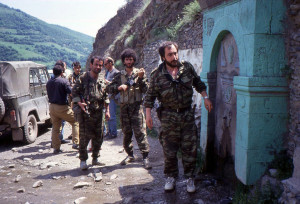 … Years ago, when Leonid Azgaldyan and I were creating the liberation army, we often went to Karvachar secretly. We admired the beautiful highlands. And we thought that the land on which an Armenian church and fortress were built in the early Middle Ages should be ours. If it is ours, then it must be returned to us, its rightful owner. Our imagination first ignited, then gradually became daring, especially when we browsed historical sources and learned that the enemy had besieged the fortress of Karvachar for centuries, but had never been able to conquer. Armenian soldiers have always kept it invincible. At that time, many did not understand why we set up one of our first military camps in Vardenis. The liberation of Kelbajar was not just an emotional impulse, it had important strategic motives, because if Artsakh was besieged, Armenia would be given the opportunity to communicate with the Mrav Mountains by a short way.
… Years ago, when Leonid Azgaldyan and I were creating the liberation army, we often went to Karvachar secretly. We admired the beautiful highlands. And we thought that the land on which an Armenian church and fortress were built in the early Middle Ages should be ours. If it is ours, then it must be returned to us, its rightful owner. Our imagination first ignited, then gradually became daring, especially when we browsed historical sources and learned that the enemy had besieged the fortress of Karvachar for centuries, but had never been able to conquer. Armenian soldiers have always kept it invincible. At that time, many did not understand why we set up one of our first military camps in Vardenis. The liberation of Kelbajar was not just an emotional impulse, it had important strategic motives, because if Artsakh was besieged, Armenia would be given the opportunity to communicate with the Mrav Mountains by a short way.
By GRIGOR JANIKYAN
From the Hay Zinvor archives
Category: #36 (1356) 9.09.2020 - 15.09.2020, Spotlight, Pages of History










